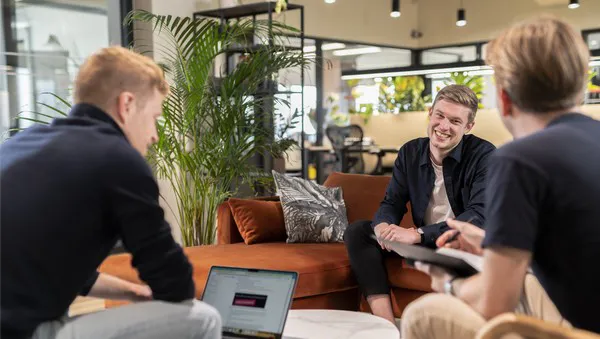Various developments in the sector highlight the importance of data and digitalization. Staff is becoming scarcer, and things like scaling up and chain integration call for a renewed approach. Artificial intelligence (AI) is expected to play a crucial role in this.
Horticulture is, in itself, a very data-rich environment. Computers and software systems made an early entry into this sector and have ensured that much data has already been gathered. However, companies often still do not use this data, or only to a limited extent, for their business operations. The Dutch company, PEAX Data, turns these 'zeros and ones' into information horticultural and fruit and vegetable businesses can put to good use every day, the right way.
Grower's son, Guus van Heijningen, founded the company. He studied data science in Ghent, Belgium, and has been involved with AI for quite some time. First, outside of horticulture; however, through his network, he gradually returned to the sector. Reason enough to take the step of starting his own company in the fall of 2021. By now, PEAX employs several people and wants to keep growing.
Whether it be growers, suppliers, breeding companies, or fruit and vegetable traders, PEAX can be of assistance. The company's - best described as an AI software developer - biggest mission is to make the horticulture sector smarter, says Guus. "We want to get companies and entrepreneurs to recognize the value their data offers."

Guus van Heijningen has achieved an important goal if more and more people in the horticultural sector are reaching out to PEAX with AI questions.
Autonomous cultivation
The company's website lists what you can achieve using Artificial Intelligence. "AI is a catch-all term. By now, many people are familiar with the phrase but aren't sure what to do with it. I sometimes compare it to the rise of the Internet. In the beginning, people also wondered what value it would have for them. These days, it's impossible to imagine the business world without it."
That list includes autonomous cultivation, an area in which PEAX's clients are active. "We help our customers by developing algorithms and writing software. In many cases, those are customized solutions. We're also busy developing generic, proprietary tools to help companies on a larger scale," Guus continues.
Autonomous growing is only one of the ways AI can be used in the horticultural sector. There is so much more that can be done with data and AI. For a breeding company, PEAX worked on connecting insight from retail data to the company's variety of data. "We developed a tool that collects data and links it to varieties in the breeding company's assortment."
Safeguarding sector knowledge
Guus and his team received their very first assignment from a cultivation company. "The owner wanted to safeguard knowledge with a view to his retirement. That knowledge couldn't simply disappear; it had to be transferred. We developed a tool that will transfer this grower's knowledge and experience to his successors," explains Guus.
Know-how and labor are ever-present challenges in horticulture. Guus, thus, also sees a role for AI in something like production planning. "It's quite challenging for growers to plan production, especially in ornamental plant cultivation. You have to not only harvest part of the crop every week but have to refill the greenhouse, often with several types of plants, while doing so. AI can help with that."
Chain integration
Many companies in the sector are busy with chain integration too. "Producers and distributors are working hard on this. That cooperation means plenty of knowledge is being exchanged, but they don't always know exactly how best to do that."
Consider, for instance, a distributor/producer relationship, he says. "What volume does a distributor expect to get from the grower? And what volume does the distributor expect to sell? In both cases, that information is shared among themselves. Here, too, AI can play a role. We're developing models that predict supply and demand and what the best price is at which to sell a product."
Horticultural know-how
Underlying PEAX's work is always a historical dataset and a business process. From there, the data specialists begin creating a model that ties in with the client's business process. It doesn't really matter what kind of company it is. "Multiple industries can use our knowledge. Ultimately, it's about the process and what data is important in that process," Guus explains.
You, however, need horticultural know-how to transform all those zeros and ones into information customers can use. That is something Guus has, but what about his colleagues? PEAX is, unusually, located in the center of Rotterdam. A conscious choice, says Guus. "It helps us attract people with the right skills. We need bright minds who can handle data well; those profiles are scarce." They often visit nurseries. "Bringing new coworkers to take a look in the greenhouse, or getting to know a customer, is standard practice."
AI advisor
Guus has reached an important goal if more and more people in the horticultural sector approach PEAX with AI questions. But that could be even more. "For us, that shows that the sector is developing and recognizes AI opportunities. I have no doubt this will increasingly continue to happen, and this is where I see a place for us," he says.
Guus' explanation of their role mirrors that of a crop consultant. "Yes, you could perhaps consider us AI advisors to the sector." For example, PEAX organizes strategic AI sessions at clients' premises. "They have a strategic objective; we show how AI can help and draw up a concrete plan for that."
Guus is not concerned that, gradually, more businesses will learn these 'tricks, potentially putting PEAX out of business. "We like teaching people how to use AI to gain increased value from their data. The market is constantly changing with new techniques and possibilities continually emerging."
"It's almost always the case that if you open one little door, ten new possibilities present themselves. So, there will always be more than enough work. The challenge is finding enough good people who can make something of the data. Companies that hire these kinds of people are well aware of this," Guus admits.
Human expertise
In late 2022, PEAX and a client will organize a hackathon, partly inspired by those held during Autonomous Greenhouse Challenge. "We hope to attract new talent," says PEAX, which is sorely needed to fill the growing demand. That demand is currently still mostly from the Netherlands and Belgium, but by showing what value it brings, Guus expects to arouse interest from overseas too.
"The horticultural sector still relies heavily on its own experience and gut feel. AI can help with that, but you do still need some human expertise, for unprecedented situations, like Brexit or COVID-19." Or the current extreme energy situation, although that is nothing new. "There's, unfortunately, very little historical data on that. Perhaps, this time, we should encourage growers to dust off their notebooks and digitize them, to learn from them," Guus concludes jokingly.
For more information:
Guus van Heijningen
PEAX Data
Microlab, 10th floor
45 Aert van Nes Street
3012 CA, Rotterdam, NL
Tel: +31 (0) 103 046 037
Email: [email protected]
Website: www.peaxdata.com
